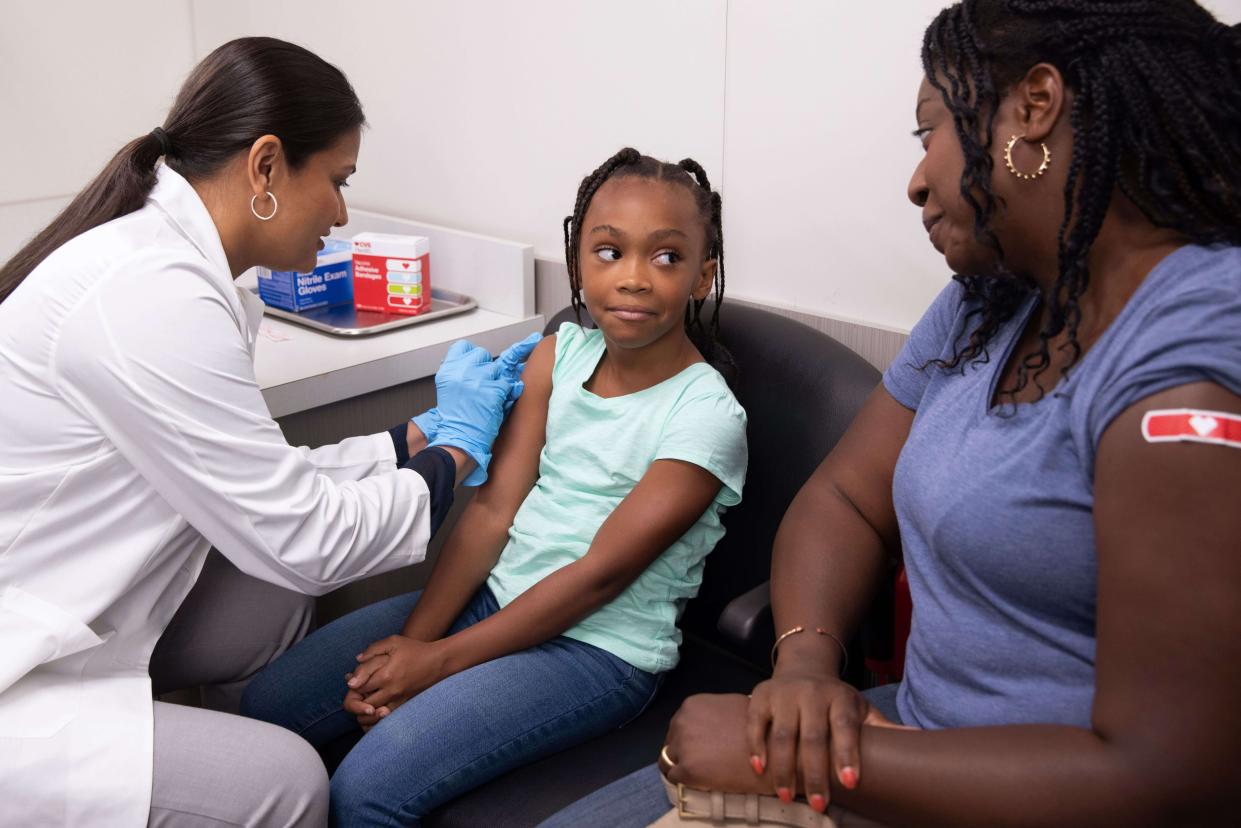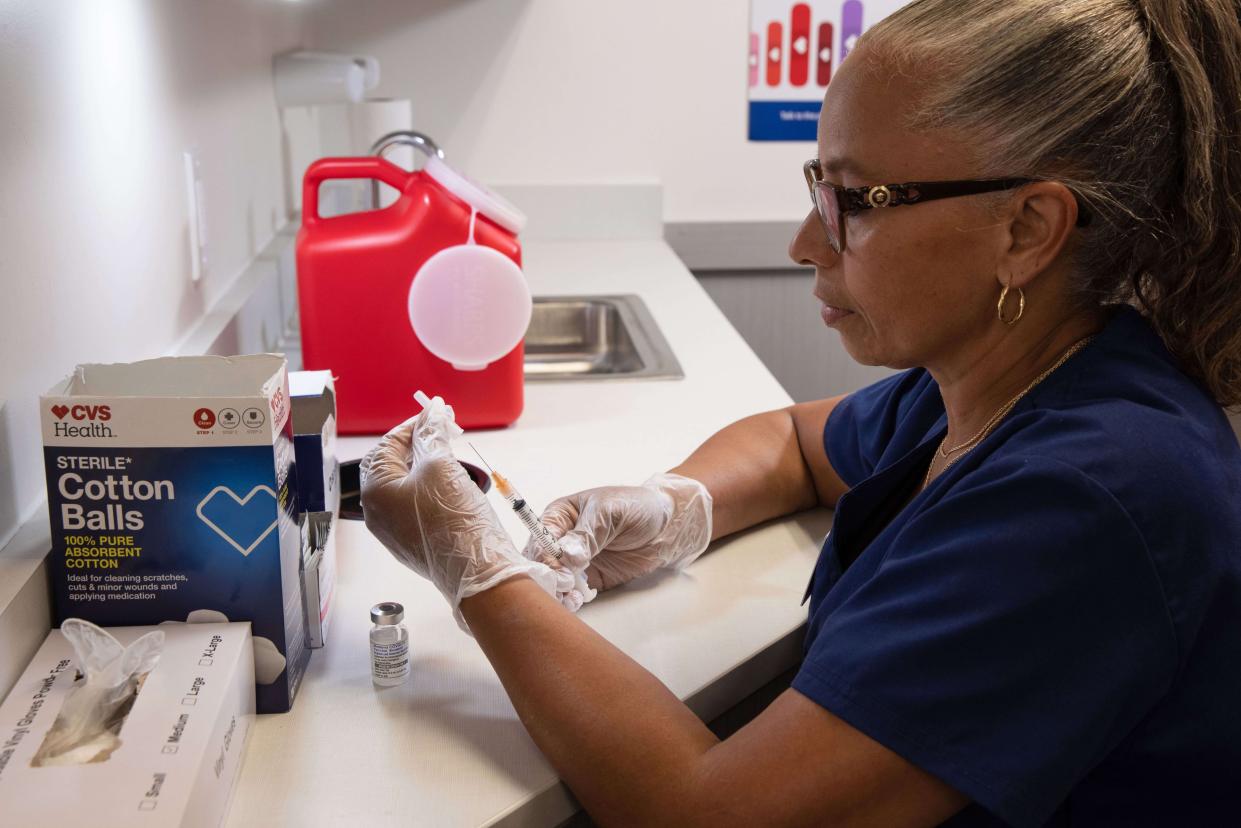Kentucky faces high rates of respiratory illness. What to know about flu season.
Achoo! Here’s yet another frequent reminder to cover your nose and mouth when you sneeze, because plenty of germs and illnesses are going around this winter. Heading into the peak of flu season, respiratory illness rates are through the roof, elevated in most areas around the country.
According to the Centers for Disease Control and Prevention (CDC), diagnoses of influenza, COVID-19 and RSV have remained elevated nationally, as well as right here in our own backyard.
Do you need that shot? How to sort through vaccination noise.
Data indicates Kentuckians currently face respiratory illness activity at high rates, and Tennessee is reporting the highest national levels of diagnoses. Kentucky residents are most commonly reporting cases of COVID-19 and Influenza, CDC data shows.
So how do you stay safe during the peak of flu season? Johari Martin, licensed pharmacist, and CVS Health regional director, oversees various areas including parts of Ohio, West Virginia, Maryland, Virginia, and Kentucky. Martin said in Kentucky, she is responsible for overseeing northern Kentucky, Louisville, Lexington, and eastern parts of the state.

It's not just 'flu season.' What other illnesses are common?
Martin said nationally, rates of COVID-19, Influenza, commonly referred to as the flu, and RSV are relatively high.
“Specifically, seasonal flu is still really elevated throughout the country which is normal for this time of year," she said. "The latest data in Kentucky shows that there are elevated rates of flu, as I just alluded to, and also COVID, and RSV, so all three of those preventable diseases all have elevated rates in Kentucky currently.”
How long does flu season last?
“Typically, respiratory season, it’ll peak in February, which we’re very very close to, and it can continue into May. It all just depends on the seasonality, the weather,” she said.
Who should get vaccinated for influenza, COVID and RSV?
Martin has varying recommendations for the flu shot, RSV vaccine, and COVID-19 vaccine. She said everyone should get the flu shot.
“It’s the best way for each of us to protect ourselves and our family from the flu and as per usual an annual flu shot is recommended for every single patient,” she said. “In terms of COVID-19, anyone over the age of five should get that and for RSV it’s any patient 60 and older because the older adults are at a greater risk for serious complications from RSV because, as we know, the immune system will weaken with age.”
The CDC also recommends a new COVID-19 vaccine, produced by both Pfizer and Moderna.
“The CDC is now recommending a single dose of the updated COVID-19 mRNA vaccine," Martin said. "Both Moderna and Pfizer have made new, updated versions of this vaccine and as long as it’s been at least two months since the last dose of the COVID-19 vaccine, anyone over the age of five and older can get that.
Flu season: Tennessee leads the country with the highest levels of influenza-like illness
How can the flu, COVID-19 and RSV be prevented?
In addition to getting vaccinated, many other precautions can be taken to prevent getting sick.
“Obviously, if we can increase the frequency of our patients washing their hands throughout the day, practicing just good health habits in general," Martin said. Those could include getting enough sleep, physical activity, hydration and limiting physical contact with others.
She suggests parents lead by example, as they are a major proponent in spreading such illnesses.
“Kids are back in school and unfortunately that’s where a majority of our children do come in contact with others and so that’s huge to make sure that our children as well are fully aware of the good health habits and that’s the biggest piece,” Martin said. “For school-age children, we always want to remind them of the importance of hand washing, as well as using tissues when they cough or sneeze, teaching our kids to use tissues or if it’s not available to make sure they are coughing into their elbow, not into their hands.”
Martin further said to make sure children wash their hands with warm water and soap for a minimum of twenty seconds and have hand sanitizer readily available in situations where you can’t immediately wash your hands.

What should you do if you get sick?
Most importantly, stay home and limit contact, Martin said. “We don’t want to go out and do work or school and infect others, so that’s huge.” She continued saying similar precautions can be taken to the preventative ones, like washing one’s hands frequently and wearing a mask in public.
As for COVID-19, an oral antiviral can also be given to alleviate some of the symptoms.
“(At CVS) We do have the ability in many of our stores to prescribe the COVID-19 oral antiviral called PAXLOVID,” Martin said. “We have the clinical capability through our pharmacist to assess patients, they can make appointments for that online as well, so we have that as an option.
“We’re getting back to normal, we’re getting back into our regular routine again, but we really need to limit that contact when we’re not feeling the greatest.”
Why are rates high this year?
“There’s been so much focus on COVID but also it hasn’t been talked about as much as prior so reminding patients that we still need to stay up to date on our vaccines, reminding patients that we still need to do all of the good health habits and especially as everyone’s trying to get back to their activities, to limit contact,” Martin said. “If you’re child’s feeling ill or if you’re feeling ill, the best thing to do is to stay home and limit spreading that to others while we continue to get back to our day-to-day activities.”
Martin said it’s not too late to get up to date on one’s vaccines, and it’s the best way to keep one another safe.
The viruses that keep on giving: Flu, COVID cases up over Christmas, expected to keep rising
“There’s still a lot of patients out there who haven’t been vaccinated for one, two, or all three of these, and that’s going to be the best way for all of us to decrease these numbers of cases across the board and/or decrease the severity of them is to remind everyone that it’s not too late to get vaccinated, and again, we peak in February through May, so there’s still a lot of time there,” she said.
This article originally appeared on Louisville Courier Journal: What to know about Kentucky flu season, with illness rates elevated nationally
